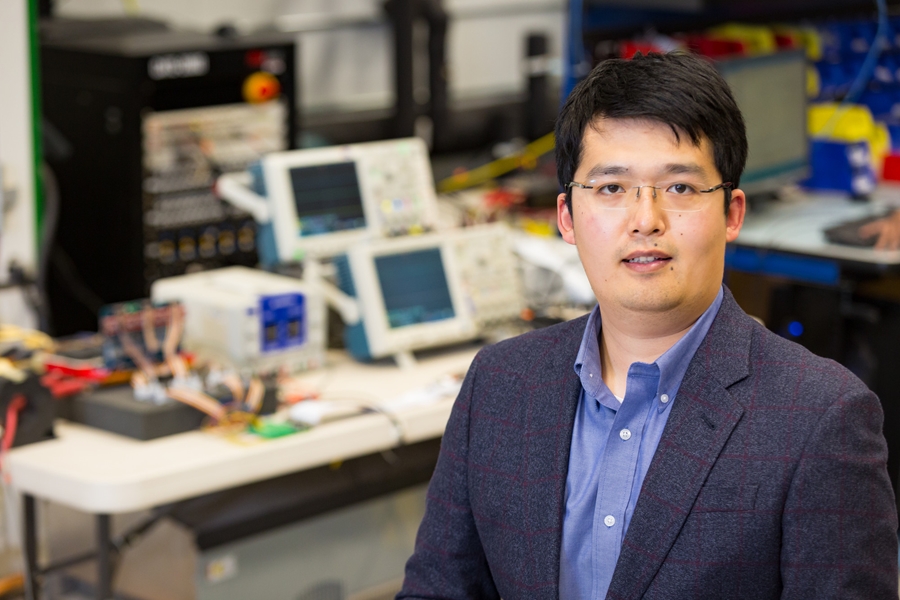FAYETTEVILLE, Ark. – Yue Zhao, assistant professor of electrical engineering, has received a $500,000 grant from the National Science Foundation’s Faculty Early Career Program to support his research on silicon carbide motor drives.
Silicon carbide devices can be used to make high-power motor drives to power electric and hybrid electric vehicles, and “more electric” aircraft and ships. Developing vehicles that use electric power along with, or instead of, fossil fuels is an important step in increasing the sustainability of the transportation industry, Zhao explained.
Motor drives convert DC power from a vehicle’s battery into the AC power that runs the traction motor. In order to do this, the power electronic devices in the motor drive need to be switched on and off quickly to create an alternating current. The power electronic devices in existing motor drives, which are made of silicon, normally have a switching frequency of less than 10 kilohertz. The silicon carbide motor drive that Zhao is working on could achieve a switching frequency between five and 10 times faster.
In addition to this higher switching frequency, silicon carbide also enables a higher power density. For example, silicon carbide motor drives that are only 20 percent the size of their silicon counterparts can deliver the same amount of electric power. Silicon carbide devices can also withstand higher temperatures.
Zhao explained that the high switching frequency and power density of these drive systems also presents challenges. The fast switching of power electronic devices creates a lot of heat in a confined space, and it generates electromagnetic interference, which can compromise the performance of the vehicle. His research will address these challenges through a new approach to controlling the motor drive, which he calls a dual-core control framework.
In Zhao’s framework, the performance of both the motor and the drive system will be monitored and a control algorithm will continuously optimize the switching sequence, making the system more efficient than traditional motor drives. This approach will minimize the amount of heat and electromagnetic interference that is produced by the drive system.
Zhao explained that there is a lack of facilities capable of testing this kind of technology at the power level necessary to run an airplane or a ship. His NSF award will also support an effort to build on the capabilities of the U of A’s National Center for Reliable Electric Power Transmission, a six megawatt power electronics testing facility. Zhao will develop a unique testbed at the center in order to test his designs and increase the U of A’s capability for future research in this area. Zhao will also integrate graduate and undergraduate research and K-12 outreach and education efforts, to provide learning opportunities for students interested in power electronics.
About the College of Engineering: The University of Arkansas College of Engineering is the largest engineering program in the state of Arkansas. Over the past decade, the college has experienced unprecedented growth. Undergraduate enrollment has doubled since 2007, and total enrollment in the college is now over 4,000 students. The College of Engineering offers graduate and undergraduate degrees in nine engineering fields, as well as incorporating distance learning and interdisciplinary programs. Faculty in the college conduct research in many key areas, including electronics, energy, biomedical and healthcare engineering, materials science, transportation and logistics.
About the University of Arkansas: The University of Arkansas provides an internationally competitive education for undergraduate and graduate students in more than 200 academic programs. The university contributes new knowledge, economic development, basic and applied research, and creative activity while also providing service to academic and professional disciplines. The Carnegie Foundation classifies the University of Arkansas among only 2 percent of universities in America that have the highest level of research activity. U.S. News & World Report ranks the University of Arkansas among its top American public research universities. Founded in 1871, the University of Arkansas comprises 10 colleges and schools and maintains a low student-to-faculty ratio that promotes personal attention and close mentoring.
Topics
Contacts
Yue Zhao, Assistant Professor of Electrical Engineering
College of Engineering
479-575-4627,
Camilla Shumaker, director of science and research communications
University Relations
479-575-7422,
